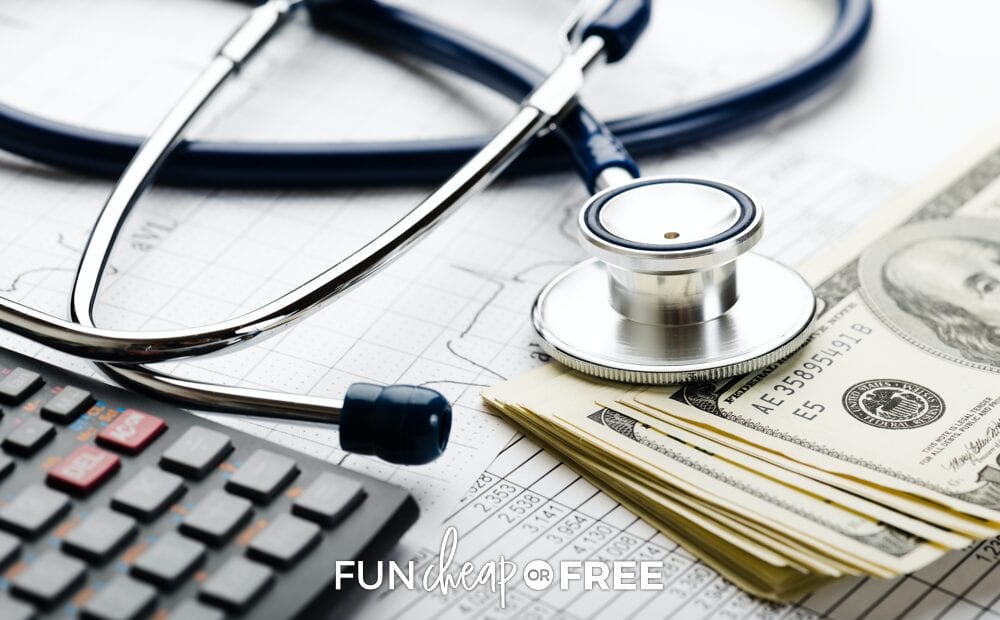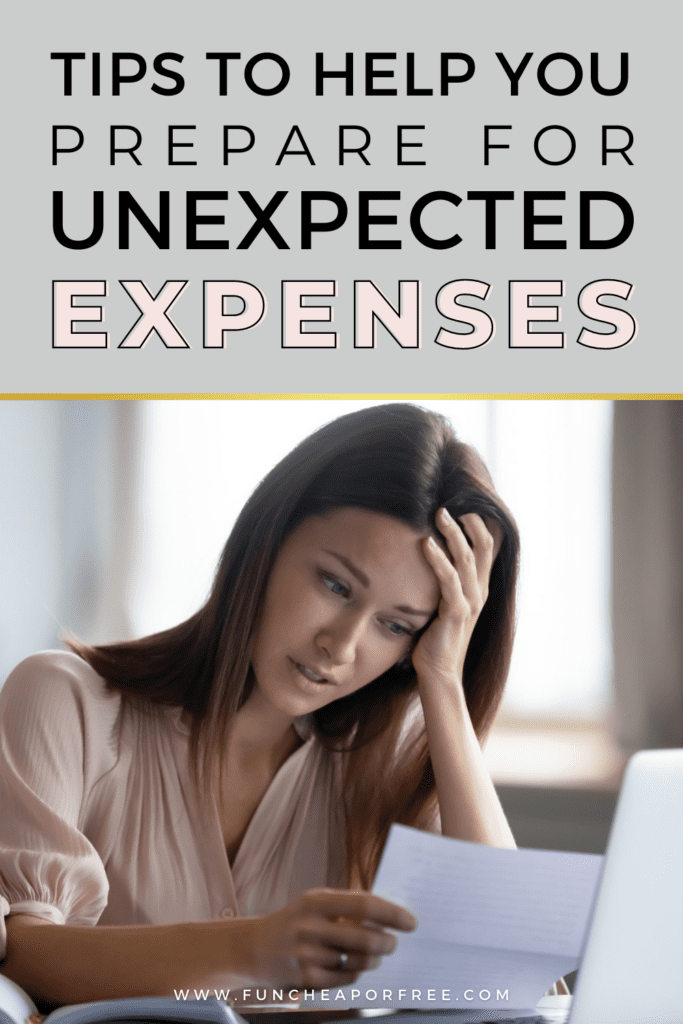Unexpected expenses happen, it’s a fact. We’ve all experienced them at some point in our lives. Make sure you have the funds to cover unforeseen expenditures so you can alleviate the stress that accompanies dishing out a large sum of money that wasn’t in the budget.

Whether it's a medical emergency, flat tire, home repair, or vehicle repair, the fact remains the same that you're going to have to pay for it somehow. This is where having an emergency savings account will be beneficial.
*Note: When you click the links in this post, we may receive a commission at no extra cost to you.
In our blog post “7 Bank Accounts Your Family Should Have,” we introduced you to the idea of a family savings account (also referred to as a “holding tank”). This specific account is used to hold up to three months of living expenses, short term savings goals, and for emergency, unexpected expenses.
It's never too early to start budgeting for unexpected expenses that can and will creep up on you. Not sure how to begin budgeting or even how much you should budget for? Keep on reading!
HOW TO PREPARE FOR UNEXPECTED EXPENSES

Unexpected expenses are a natural part of life. They're something that we can’t always predict, but we can at least plan for. Being prepared is the first step in getting through the stress that comes with unexpected expenses. Here are a few different things you can do to be prepared for those times when you’ll need to pay for something with little to no notice or warning:
- Open Multiple Bank Accounts – One of these accounts should be a family emergency account. These funds are intended to be used for emergencies like an unforeseen expense that needs to be funded quickly. Allocate a specific amount of funds for each account monthly, building up your savings account over time.
- Have Adequate Funds – Adding funds to your account every month helps ensure that you are prepared for emergencies without completely upending your monthly budget.
- Replenish Funds – Once you have successfully recovered from the unexpected expenditure, replenish the used funds for another unexpected financial emergency.
Check out our simplest budgeting method ever for smart and simple ways to save money and ensure you've got some stored up for a rainy day!
WHAT TO DO WHEN YOU HAVE AN UNEXPECTED EXPENSE OCCUR
When an unexpected expense happens, just remember to take a deep breath! While it might be stressful and possibly even scary to think about, you can do it. Follow these tips:
- Access Funds – An emergency savings account with your regular bank is recommended as you’ll have easy access to your funds. When your funds are located in a bank other than your primary bank, access to funds is less easy. Plus, you might not have days to wait depending on the expense.
- Avoid any Unnecessary Spending – When you have an unexpected expense pop up, avoid any unnecessary spending until the expense has been paid for. Now it is more important than ever to stick to your monthly budget to avoid going into debt.
- Avoid Debt – The last thing you want to do is to go into debt to pay for an unplanned expense. Find ways to make some extra cash to pay for the expense if you don’t have the funds available. Get creative if necessary, finding ways to save and avoid going into debt if possible. Cancel our Amazon Prime if it's causing you to spend more!
Don't overlook emergency preparedness in other facets of your life, too. It's important to stock up for emergencies with money, supplies, and food to make sure your family's needs are covered.
HOW TO BUILD UP YOUR FAMILY EMERGENCY SAVINGS ACCOUNT

How can you build up your family’s emergency savings account? We recommend that you implement and live by the 70% rule. This helps you to live within your budget, while still being able to add to your savings account every month. Here are a few other ways to also make (or to save) extra money extra for your emergency savings account:
- Side Hustles – There are different side hustles that make a few extra bucks. These can be added to your emergency savings. It can be as simple as babysitting, selling handmade items, or offering tutoring services.
- Spending Freeze – Have you ever considered trying a spending freeze for a week? If you haven’t you should try it! This is a great way to save some extra cash, and add it to your emergency savings account. See just how much you can save by saying no to unnecessary spending throughout the week.
- 70% Rule – With the 70% rule, you learn to live on 70% of your income. This allows you to save for unexpected expenses that may come up, regardless of how much money you make. The remaining 30% of your income, should be split between savings/debt and charitable donations, investing, or college funds.
Pro Tip: Auto draft a set amount from your checking account every month until you reach the recommended 3 months of expenses saved.
LET BUDGET BOOT CAMP HELP!
If all of this sounds fantastic but you would like some extra hand-holding while you're saving up, then Budget Boot Camp is for you! It's our fun, online video program that makes managing your finances and getting out of debt a breeze. Check out what we're talking about…
Sounds awesome, right? We know you'll love it so much that we even have a 100% money-back guarantee! Plus, you can use the code FCFBLOG for 10% off at checkout. You're welcome. 😉
WHAT UNEXPECTED EXPENSES TO CONSIDER SAVING FOR

An unexpected expense can take the shape of anything you weren't planning on or budgeted for. Because you don’t know what exactly you are saving for, consider the following:
- Medical Expenses – Everyone knows that medical bills can be extremely expensive. This is why having adequate savings is important to help offset the cost associated with emergency medical expenses. A health savings account (or HSA) is the perfect place to put this money.
- Vehicle Maintenance – We all depend on our vehicles to get us around, to and from work, home, school, etc. When our vehicle needs maintenance it can put a damper on our monthly budget, especially if it is an unplanned expense. Once again, having an emergency savings account can help to lighten the burden associated with repairing your vehicle to keep you on the road.
- Home Maintenance – Owning your own home is a great accomplishment, but with it comes the added expense of home maintenance. Some repairs you can plan for, while others happen with no warning, leaving you with no option but to use your emergency funds to foot the bill to make the repair.
No matter how you choose to save for your emergency fund (or what it consists of), don't wait to get started! Start saving up today, and soon enough those dollars will become a solid rainy day fund you can draw from when an emergency strikes.

How have you planned for emergencies? Are you saving up those pennies for a rainy day? Let us know in the comments below!
While you're at it, check out these other posts for tried and true proven budgeting and financial tips:
- Tired of overspending? Use our tips to bounce back and stop the vicious cycle!
- Check out these 8 money-saving hacks to save you $100 right now, and jump-start your emergency savings account.
- Build up your budget with these seven bank accounts your family needs!
Keep on saving!

0 Comments